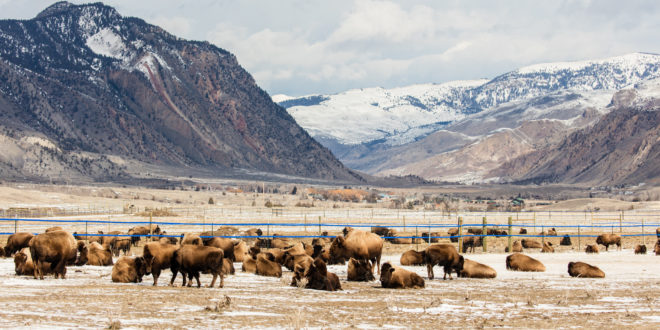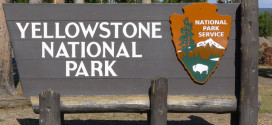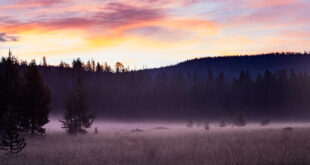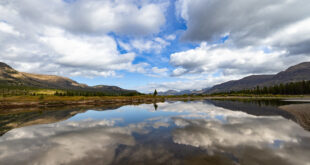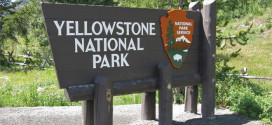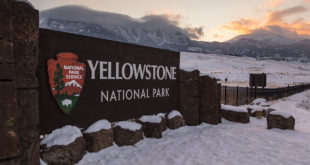Yellowstone National Park could send bison to the Fort Peck Indian Reservation in eastern Montana by the end of the year.
It would be the first shipment of brucellosis-free bison out of the park in recent memory.
In addition, according to the Bozeman Daily Chronicle, Yellowstone Superintendent Dan Wenk received verbal approval from federal agriculture officials regarding the park’s bison quarantine corrals. Wenk added that the regional director of the National Park Service is expected to sign off on the plan in early May.
Tribal and conservation groups have long sought Yellowstone bison for incorporation in existing conservation herds or to establish new herds outside the park. Shipping bison to Fort Peck would be the first step in this direction.
The news comes after hunters and managers culled over 1,200 bison from the Yellowstone herd, well above the 600-900 bison goal set in fall 2017. The park retained 98 bison in its corrals at Stephens Creek. Wenk said some of those bison could be heading to Fort Peck this year after being tested for brucellosis. From the Chronicle:
The Fort Peck Tribes want to quarantine bison at their reservation but the facility they built hasn’t been approved by federal officials because of a policy that requires such facilities to be near Yellowstone. As a result, the bison still have to be deemed disease free at the park’s corrals before being trucked to the reservation.
Majel Russell, legal counsel for the tribes, said that policy should change. But, in the meantime, they’ll accept the bison that graduate the park’s quarantine program.
“Our end goal is to preserve the Yellowstone bison,” Russell said. “We’re willing to work with their two-part solution.”
Brucellosis is a disease that affects bison, elk, and cattle. It can cause abortions in pregnant animals; it is also a zoonosis, meaning it can spread from animals to people. Brucellosis (also called undulant fever in people) used to be more common before the rise of pasteurization and stricter meat regulations. To that end, brucellosis in cattle can mean lengthy quarantining, delayed shipments, and possible quarantining of cattle—that’s why livestock managers call for such stringent management of bison, which they see as a threat.
To date, however, there has never been a case of bison-to-cattle brucellosis transmission. There have been, however, cases of elk-to-cattle brucellosis transmission, and elk are seen as more likely culprits.
Agencies like Montana Fish, Wildlife & Parks and the Montana Department of Livestock study wild elk in an effort to understand brucellosis transmission and treatment, but they are not culled the way Yellowstone bison are.
The hunting and slaughter of Yellowstone bison is a contentious topic, with conservation and animal advocacy groups decrying management as cruel and unnecessary. Some years get more heated than others.
This year, for instance, five people have been arrested for trespassing in Stephens Creek and attempting to obstruct the shipment of bison out of the park. The first arrests happened in early March, when three people were arrested for trespassing and chaining themselves to the Stephens Creek squeeze chute. The second arrests happened shortly afterwards, when a pair of men chained themselves to concrete-filled barrels along the Stephens Creek service road.
All five belong to Wild Bison Defense, a bison advocacy group that protests the treatment of bison in Yellowstone National Park.
In addition to these arrests, there have been several incidents of sabotage at Stephens Creek, which previously derailed attempts to ship bison to Fort Peck. The first incident happened in January, when someone cut fences containing corralled bison. In February, fences were cut again, releasing over 70 bison being held there.
Quarantine is a controversial proposal for Yellowstone bison. Park officials and conservation groups argue it is more humane than hunting and slaughter and promises a means of reintroducing bison to their historic range. Bison advocacy groups like WBD and the Buffalo Field Campaign, however, contend that quarantining is an attempt to domesticate bison. These groups argue bison should be allowed to roam unhindered and reclaim range on their own initiative.
This story has been updated with additional information.
 Yellowstone Insider Your Complete Guide to America's First National Park
Yellowstone Insider Your Complete Guide to America's First National Park
